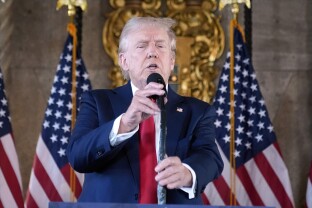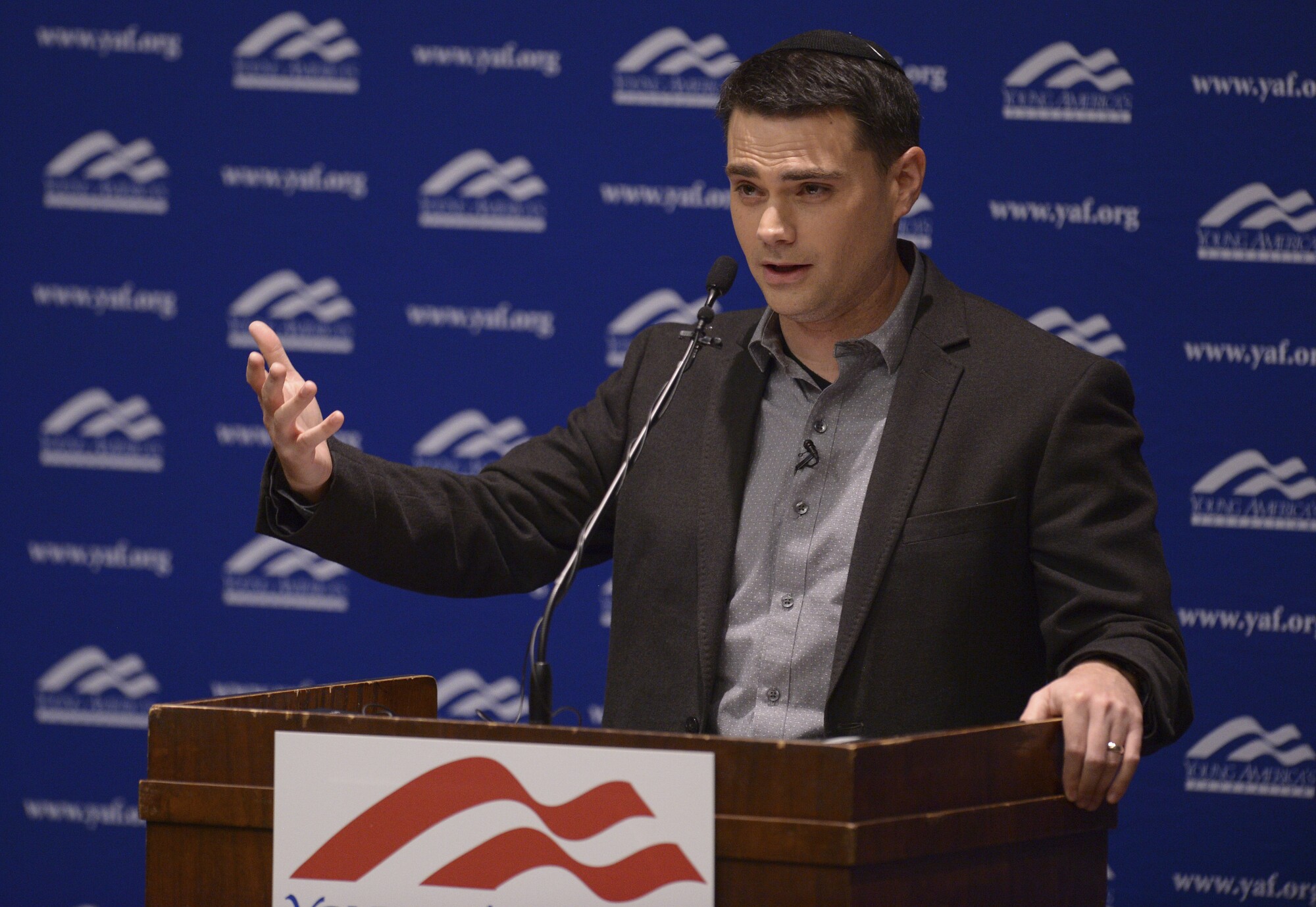Donald Trump rarely gives time to big networks or major outlets unless it’s Fox News. Yet, he’s been a consistent presence on long-form podcasts, giving freewheeling interviews to friendly hosts on everything from the war in Ukraine to the JFK assassination and aliens.
Plenty of clips from these podcasts have gone viral on social media, like when Trump explained his speech patterns to one interviewer as the “weave” or asked another podcast host if they do cocaine. But in between those moments, Trump is articulating his “strongman” approach to the world — one that communications experts and political historians say speaks directly to the low-propensity voters core to Trump’s electoral strategy.
In more than 12 hours of Trump’s podcast interviews, NOTUS found the former president oscillating between familiar lines from his rallies to more expansive proclamations — particularly on foreign policy.
He almost always quotes Viktor Orbán, the far-right prime minister of Hungary, when asked how he sees global issues being resolved under his possible presidency. On multiple podcasts, Trump has warned about the great possibility of World War III. And whenever the wars in Ukraine or Gaza come up, he paints a particularly dark future.
“The stick is generally more successful, and you know, we’re talking about war,” Trump said about his approach to geopolitical negotiations on the tech and politics host Lex Fridman’s podcast, which has gained a following among Silicon Valley’s “anti-woke” elites.
Throughout, Trump goes relatively unquestioned, with sympathetic podcast hosts like Logan Paul, Ben Shapiro and Dave Ramsey reaffirming him. Unlike his rallies, the audiences aren’t necessarily Trump superfans. The shows aren’t purely politics; they span gun culture, combat sports and shock-value humor.
“This is an expansion of his appeal to this very disaffected young, male audience,” said Adrienne Massanari, an American University professor who has studied the rise of the far-right and the role gender and new media have played in mobilizing potential voters.
“On these podcasts, the kind of Gen Z bro podcasts, I think his message is pretty similar,” said Matt Dallek, a political historian from George Washington University. “The foreign policy discussions serve a very neat domestic purpose for him. It really is a very traditionalist viewpoint, which appeals to sort of young, often disaffected men.”
***
In an interview with Shapiro, Trump took the opportunity to bring up Orbán, the far-right leader who has pushed an anti-LGBTQ+ and anti-Muslim agenda and cracked down on a free press and academic institutions, among other policies.
“Viktor Orbán, a tough guy, a smart guy, as you know, he runs Hungary,” Trump tells Shapiro. “And he made the statement that if Trump comes back, everything will be settled.”
At another point, Trump implied he’d use the American military’s might more as president: “The fact is our military, if you have the right leader, is very powerful. It’s very good,” he said.
On Fridman’s show, Trump slid into praise for Orbán yet again.
“He said, ‘The world has to have Trump back because everyone was afraid of Trump.’ Now that’s what he said, so I’m not using that term, but I think they respected me,” Trump tells Fridman listeners. “He said, ‘China was afraid, Russia was afraid, everybody was afraid.’”
On Andrew Schulz’s show, “Flagrant,” he boasted about his relationship with Vladimir Putin.
“I got along with Russia. I get along with pretty much everybody,” he told Schulz. “Actually, the tougher they were, the better I did with them. That’s a good thing, not a bad thing because the other ones are easier to handle.”
During an interview on influencer entrepreneur and celebrity boxer Logan Paul’s “Impaulsive,” Trump meandered to the same place: Putin compared to other world leaders he dealt with during his administration.
“He said, ‘They all say you and I are friendly, but I’d hate to see you as an enemy,’” Trump said. “I got along with the tough ones much better than I got along with the weak ones. You’ve got some real weak ones too.”
Trump’s often meandering answers on the podcasts — whether about the culture, the economy or the global stage — aren’t much different than what he says at one of his rallies, but the audience could be.
“The appeal of someone like Putin, or Orbán especially, is not just simply that Trump likes ‘strongmen.’ The appeal lies as much, if not more, in this impression that Trump and his supporters have that Orbán has retaken the culture,” Dallek said.
Trump’s comments also lay out a very clear picture of what a second administration under his control would mean for the United States on a global stage.
“Trump is transmitting the fantasy that the United States can profit by being a bully on the world stage,” Stephen Wertheim, a senior fellow in the American Statecraft Program at the Carnegie Endowment for International Peace, told NOTUS of Trump’s podcast performance. “His version of being a strongman on the world stage tends to involve using the U.S. military to get commercial benefits or using U.S. commercial advantages to try to force geopolitical outcomes.”
“I think Trump is communicating, on one level, a traditional U.S. foreign policy message of peace through strength,” Wertheim continued. “But taken to a personalistic and masculinist extreme.”
Trump’s more recent comments also notably run up against the isolationist tack he has been associated with.
“Going back to the stick line, I mean, it’s not impossible that Trump will end up escalating U.S. involvement in the war in Ukraine, and I don’t think we should ignore that possibility as well,” he said.
***
Of course, Trump is not the only candidate using new media to reach different audiences. Kamala Harris got a lot of attention for her appearance on an episode of “Call Your Daddy,” a podcast with millions of Gen Z and millennial listeners. Likewise, Harris and Trump are reportedly in talks with Joe Rogan’s podcast.
In a close election, these podcasts are a Hail Mary that could give either candidate the last few thousand votes they need, particularly with younger voters who are less likely to show up at the ballot box.
Trump, in particular, is playing into what academics like Massanari have termed “the intellectual dark web” of podcasts, Reddit and web forums.
“If they vote at all, they’re going to vote Trump or, you know, maybe third party,” Massanari said. “Whether or not this is enough to mobilize them to get out the vote, I’m not sure.”
That mobilization gap is exactly what Trump is trying to chip away at. Trump’s campaign has put extra emphasis on getting sometimes voters to the polls. And Trump’s podcast call sheet could prove pivotal in November.
A Trump campaign official told NOTUS, the former president’s circuit isn’t just about reaching young men, but also connecting with voters who don’t get their news from the mainstream media.
“The question is in what kind of numbers?” Dallek said. “And then the other question is how many women, especially, and others is he alienating in the process?”
On the shows, Trump is very focused on the numbers.
“They don’t realize that the Nelk Boys are probably a lot more powerful than them,” Trump tells the “Full Send” podcast crew, saying he’s late for his next engagement with “the most powerful people in the nation,” referring to the governors, senators and political operatives. “And here I am, sitting with you, not saying to hurry up, because you’re the Nelk Boys.”
The Nelk Boys, an entertainment group that established itself with prank videos but now champions right-wing political causes, reportedly has a multimillion-dollar “Send the Vote” registration play in the works targeting young men for Trump.
“You guys may be able to do bigger rallies than me, but I’m not sure about that,” Trump says.
Combined, the shows Trump has gone on have close to 25 million subscribers on YouTube alone. He always promises that the shows he’s on will be “one of the biggest.” They perform well.
In a statement, Karoline Leavitt, national press secretary for the Trump campaign said “everything he touches turns to ratings gold” and that his appearances “have broken records and reached millions of new voters who don’t traditionally pay attention to the fake narratives coming from the lamestream media.”
“We need you back,” Kyle Forgeard, one of the Nelk Boys and host of the controversial “Full Send” podcast, said. “We need you back right now.” That episode from earlier this year had roughly 8.8 million views on YouTube in mid-October. His episode with Theo Von had 13 million views.
That said, a mathematically coded spinning doughnut was still beating Trump on the Lex Fridman channel — as was Shawn Ryan’s video of his AR-15 rifle setup.
—
John T. Seward is a NOTUS reporter and an Allbritton Journalism Institute fellow.
Sign in
Log into your free account with your email. Don’t have one?
Check your email for a one-time code.
We sent a 4-digit code to . Enter the pin to confirm your account.
New code will be available in 1:00
Let’s try this again.
We encountered an error with the passcode sent to . Please reenter your email.



